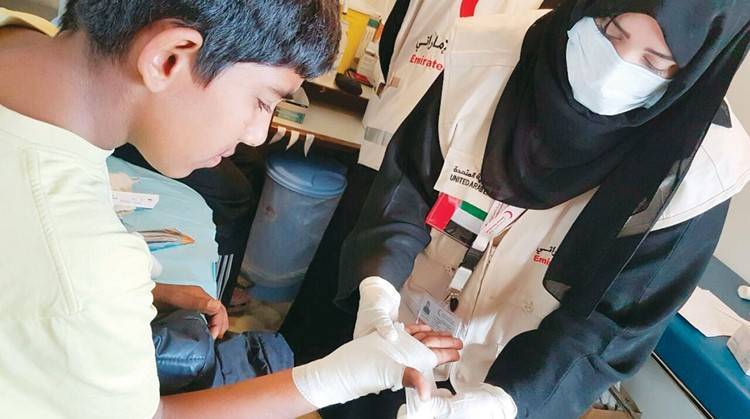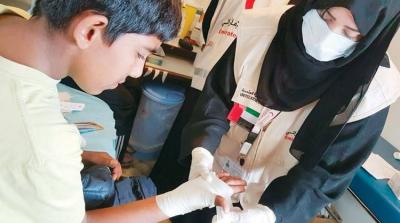Under the title "The UAE Leads International and Regional Initiatives to Alleviate the Suffering of Refugees," the Emirati newspaper Al-Ittihad published an article highlighting the United Arab Emirates' commitment to supporting sisterly and friendly countries in developmental projects and humanitarian responses to disasters and crises, as well as mitigating the suffering of refugees. Despite the challenges posed by the COVID-19 pandemic, the UAE continued to support refugees in many countries around the world, overcoming all difficulties and obstacles associated with the pandemic. Last year, humanitarian aid and medical supplies shipped from the UAE to various continents enhanced the capabilities of many governments and international organizations to cope with the pandemic's repercussions in refugee camps and areas.
The initiatives implemented by the UAE through its official agencies and charitable institutions have strengthened the services directed at refugees, particularly in the health and education sectors, improving the condition of this group and drawing attention to their urgent and pressing issues.
In support of the wise leadership's directives to assist refugees and improve their living conditions worldwide, the UAE has launched numerous initiatives aimed at enhancing the situation of refugees. Among the most important is the health campaign currently being carried out by the Emirates Red Crescent Authority to vaccinate refugees in Jordan and Iraq against COVID-19, protecting them from the pandemic and combating its spread within and outside their camps. Additionally, the remote education initiative and digital school implemented in several refugee-hosting countries aim to support the educational process for refugee children by providing innovative and flexible educational resources to face challenges hindering their academic progress due to the circumstances of displacement.
The Refugee Women Support Fund, established by the esteemed Sheikha Fatima bint Mubarak, President of the UAE Women's Federation and the Supreme Council for Motherhood and Childhood, plays a significant role in economically, socially, and psychologically empowering refugee women, resulting in a qualitative leap in programs and projects directed toward women in developing communities.
Last year, the Emirates Red Crescent Authority distributed winter aid benefiting 125,000 refugees in Greece impacted by harsh weather conditions. This aid included heating devices, blankets, and food parcels to protect refugees from the effects of cold temperatures and reduce the spread of winter illnesses, especially among children.
The Authority also continued to provide humanitarian assistance to Rohingya refugees in Bangladesh, distributing various relief materials that benefited 45,000 refugees in camps in Cox's Bazar, including food parcels, shelter and heating materials, clothing, hygiene items, and nutritional supplements for children, along with educational supplies and study aids.
Last year, the Emirates Red Crescent implemented a winter assistance campaign worth 15 million dirhams, benefiting one million people in Jordan, Iraq, Egypt, Lebanon, and Greece, most of whom are Syrian refugees.
On the educational front for refugees worldwide, UAE efforts continue through various initiatives, including the "School in 1,000 Villages" initiative, part of the online school platform associated with Mohammed bin Rashid Al Maktoum Global Initiatives, which continued to support refugee students in Jordan and remote villages suffering from inadequate internet connectivity and technological resources, especially amid school closures and the implementation of distance learning plans.
In 2019, the "From the UAE to the Children and Women of Rohingya" campaign was launched, marking a new phase in addressing the Rohingya refugee crisis, transitioning from emergency response to confronting the increasing needs in health, education, food, water, and sanitation services for around 1.2 million refugees, mostly children, women, and the elderly. That year also saw the launch of Sheikha Fatima's humanitarian campaign to treat thousands of Rohingya women and children under the supervision of a voluntary joint medical team from the UAE and Bangladesh.
In the context of achieving one of the Sustainable Development Goals related to eradicating poverty, the UAE allocates a significant portion of its assistance to support the most vulnerable groups affected by the Yemeni and Syrian crises, along with efforts to support refugees and internally displaced persons by providing support services and coordination for managing and operating Syrian refugee camps in Jordan. Most UAE support directed toward the first developmental goal consists of multi-sector emergency assistance and social care services and health in emergencies.
Regarding education, the UAE directed its foreign assistance to support the education sector, offering numerous scholarships to programs implemented in Lebanon to ensure Syrian refugee children receive quality education and the necessary psychological support. The UAE also supported efforts by host countries to improve school systems that have been overwhelmed and strained due to the influx of refugees.
In terms of food security, the emergency food assistance sector focused primarily on Yemen, Somalia, Lebanon, Syria, Jordan, and Myanmar, prioritizing the needs of displaced persons and refugees.
The UAE's efforts to support refugees continue around the world, improving their living standards and the services provided to them.




